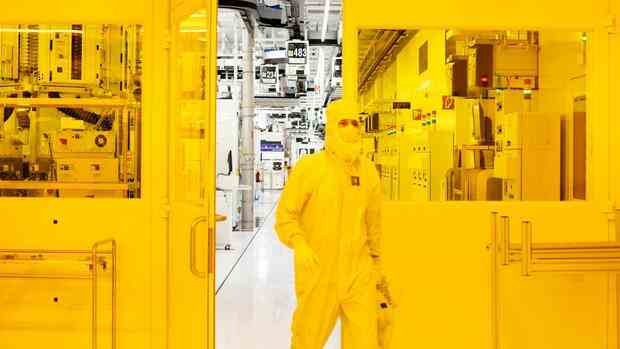High energy prices are driving business with silicon carbide power-saving chips.
(Photo: Bloomberg)
Munich Wolfspeed engineers have been developing low-power silicon carbide (SiC) semiconductors for 35 years. For decades, customers hardly showed any interest in it. The chips made from the innovative material were too expensive. In view of the high energy prices, however, buyers are now scrambling for the components. “Supply is still lagging behind demand,” said Gregg Lowe, CEO of the US group, the Handelsblatt.
“Energy efficiency is high on the agenda everywhere, and that has given silicon carbide a boost,” emphasized the manager. Other manufacturers of SiC chips can hardly keep up with production. “Orders have suddenly increased,” explained Isao Matsumoto, CEO of the Japanese semiconductor manufacturer Rohm.
SiC is more expensive than conventional silicon, but is considered very promising. With SiC chips, electric vehicles last longer, can be charged faster and reduce operating costs thanks to lower consumption. Because of the recent sharp increase in electricity prices, this is even more relevant than before.
Energy-saving chips allow electric cars to run longer
At the same time, SiC chips are smaller, lighter and emit less heat. Peter Fintl, semiconductor expert at the technology consultancy Capgemini, says: “Just by replacing silicon with silicon carbide, the range can be increased by eight percent.”
Top jobs of the day
Find the best jobs now and
be notified by email.
According to the companies, the really big boom in SiC chips is still to come. “From 2025 the market will really take off,” says Wolfram Harnack, Rohm’s European head.
>> Read here: Funding for chip factories: European technology industry is sounding the alarm
A look at the order books confirms this. Because of the scarce capacities, the car manufacturers are signing many long-term contracts. They want to make sure that they get the components in any case. The French group Stellantis, which owns Renault and Opel, recently ordered SiC chips from Infineon for a billion euros. Germany’s largest semiconductor manufacturer is to provide the components from the middle of the decade. British brand Jaguar Land Rover has just agreed a long-term contract with Wolfspeed, with deliveries starting in 2024.
There’s another reason why buyers are reserving the SiC chips for models in the second half of the decade. They assume that prices will fall massively by then. On the one hand, because the production costs always decrease with increasing unit numbers in the chip industry. On the other hand, because the industry is switching to a new manufacturing process.
As the first company in the world, Wolfspeed is currently trying to produce on a large scale in a new US plant on 200 millimeter silicon carbide discs. So far, so-called wafers with a diameter of 150 millimeters have been standard. Larger disks are more technologically demanding, but increase productivity. Consultant Fintl says: “This is an important technological leap that brings enormous cost advantages.” Competitors such as Bosch, Infineon and STMicroelectronics will follow suit in their new systems.
Corporations expect growth even if energy costs fall again
In order to get the coveted chips, customers are now investing directly in the manufacturers. The automotive supplier Borg-Warner recently invested half a billion dollars in Wolfspeed. Borg-Warner gets guaranteed access to SiC chips worth $650 million a year.
>> Read here: Infineon anticipates a sharp increase in demand for radar chips
Infineon is not quite that far yet. However, the Dax group is thinking about accepting down payments from customers, said Peter Schiefer, head of the car division. Major investments are pending: Infineon is building a new SiC plant in Malaysia and expanding SiC production in Villach, Austria.
The Japanese competitor Rohm does not demand any advance payments for the planned additional capacities, explained CEO Matsumoto. However, he expects customers to conclude long-term contracts: “We need that in order to plan.” According to Rohm, it expects SiC sales of around 900 million euros for the 2025 financial year.
Energy efficiency is high on the agenda everywhere, which has given silicon carbide a boost. Gregg Lowe, CEO of the US company Wolfspeed
The chip companies assume that the triumph of SiC will continue, even if energy prices should fall again. Rohm boss Matsumoto is convinced: “SiC is indispensable on the way to climate neutrality.”
Some semiconductor manufacturers are expecting even stronger growth than the market researcher Yole is already forecasting very positively: By 2027, industry-wide sales of SiC chips will have risen to 6.3 billion dollars, around six times as much as last year. That would already correspond to an annual increase of a good third.
More: Infineon outlook inspires investors and analysts – share price takes off

